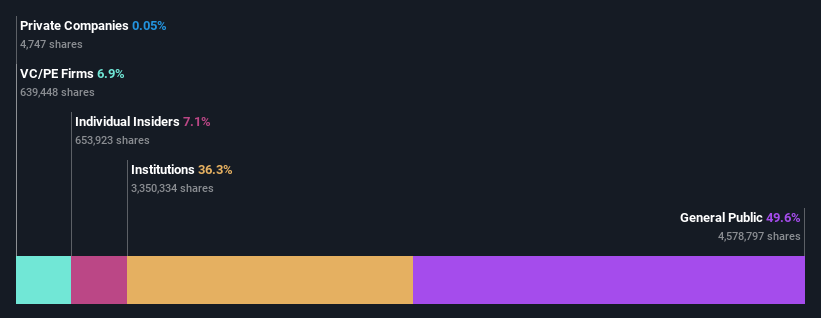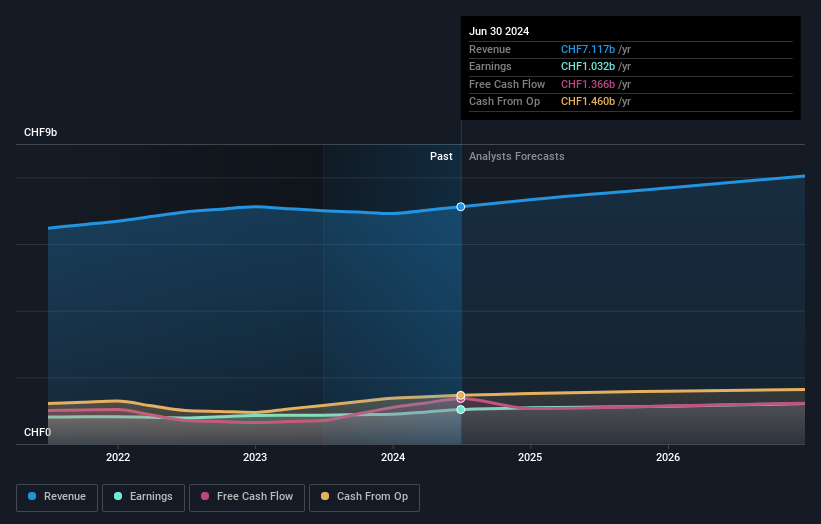- Switzerland
- /
- Chemicals
- /
- SWX:GIVN
individual investors who own 50% along with institutions invested in Givaudan SA (VTX:GIVN) saw increase in their holdings value last week

Key Insights
- Givaudan's significant individual investors ownership suggests that the key decisions are influenced by shareholders from the larger public
- 44% of the business is held by the top 25 shareholders
- Institutions own 36% of Givaudan
A look at the shareholders of Givaudan SA (VTX:GIVN) can tell us which group is most powerful. With 50% stake, individual investors possess the maximum shares in the company. Put another way, the group faces the maximum upside potential (or downside risk).
Following a 5.1% increase in the stock price last week, individual investors profited the most, but institutions who own 36% stock also stood to gain from the increase.
Let's delve deeper into each type of owner of Givaudan, beginning with the chart below.
View our latest analysis for Givaudan

What Does The Institutional Ownership Tell Us About Givaudan?
Institutions typically measure themselves against a benchmark when reporting to their own investors, so they often become more enthusiastic about a stock once it's included in a major index. We would expect most companies to have some institutions on the register, especially if they are growing.
We can see that Givaudan does have institutional investors; and they hold a good portion of the company's stock. This implies the analysts working for those institutions have looked at the stock and they like it. But just like anyone else, they could be wrong. If multiple institutions change their view on a stock at the same time, you could see the share price drop fast. It's therefore worth looking at Givaudan's earnings history below. Of course, the future is what really matters.

We note that hedge funds don't have a meaningful investment in Givaudan. Cascade Investment, L.L.C. is currently the company's largest shareholder with 6.9% of shares outstanding. In comparison, the second and third largest shareholders hold about 6.9% and 5.1% of the stock.
A deeper look at our ownership data shows that the top 25 shareholders collectively hold less than half of the register, suggesting a large group of small holders where no single shareholder has a majority.
While studying institutional ownership for a company can add value to your research, it is also a good practice to research analyst recommendations to get a deeper understand of a stock's expected performance. Quite a few analysts cover the stock, so you could look into forecast growth quite easily.
Insider Ownership Of Givaudan
The definition of company insiders can be subjective and does vary between jurisdictions. Our data reflects individual insiders, capturing board members at the very least. Management ultimately answers to the board. However, it is not uncommon for managers to be executive board members, especially if they are a founder or the CEO.
Insider ownership is positive when it signals leadership are thinking like the true owners of the company. However, high insider ownership can also give immense power to a small group within the company. This can be negative in some circumstances.
We can see that insiders own shares in Givaudan SA. It is a very large company, and board members collectively own CHF2.9b worth of shares (at current prices). It is good to see this level of investment. You can check here to see if those insiders have been buying recently.
General Public Ownership
The general public, who are usually individual investors, hold a 50% stake in Givaudan. This size of ownership, while considerable, may not be enough to change company policy if the decision is not in sync with other large shareholders.
Private Equity Ownership
With a stake of 6.9%, private equity firms could influence the Givaudan board. Sometimes we see private equity stick around for the long term, but generally speaking they have a shorter investment horizon and -- as the name suggests -- don't invest in public companies much. After some time they may look to sell and redeploy capital elsewhere.
Next Steps:
While it is well worth considering the different groups that own a company, there are other factors that are even more important. To that end, you should be aware of the 1 warning sign we've spotted with Givaudan .
If you are like me, you may want to think about whether this company will grow or shrink. Luckily, you can check this free report showing analyst forecasts for its future.
NB: Figures in this article are calculated using data from the last twelve months, which refer to the 12-month period ending on the last date of the month the financial statement is dated. This may not be consistent with full year annual report figures.
New: Manage All Your Stock Portfolios in One Place
We've created the ultimate portfolio companion for stock investors, and it's free.
• Connect an unlimited number of Portfolios and see your total in one currency
• Be alerted to new Warning Signs or Risks via email or mobile
• Track the Fair Value of your stocks
Have feedback on this article? Concerned about the content? Get in touch with us directly. Alternatively, email editorial-team (at) simplywallst.com.
This article by Simply Wall St is general in nature. We provide commentary based on historical data and analyst forecasts only using an unbiased methodology and our articles are not intended to be financial advice. It does not constitute a recommendation to buy or sell any stock, and does not take account of your objectives, or your financial situation. We aim to bring you long-term focused analysis driven by fundamental data. Note that our analysis may not factor in the latest price-sensitive company announcements or qualitative material. Simply Wall St has no position in any stocks mentioned.
About SWX:GIVN
Givaudan
Manufactures, supplies, and sells fragrance, beauty, taste, and wellbeing products to the consumer goods industry.
Solid track record average dividend payer.


